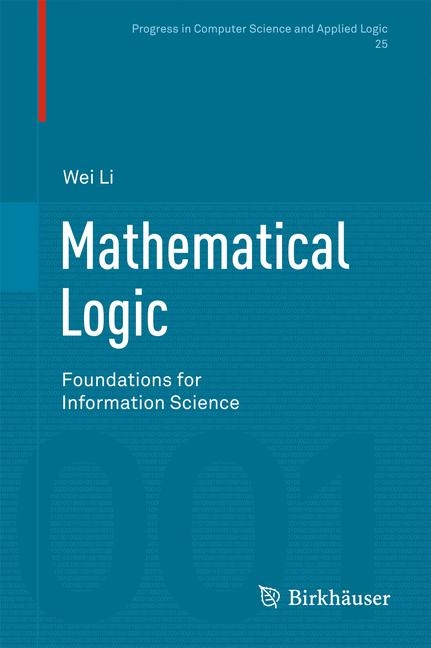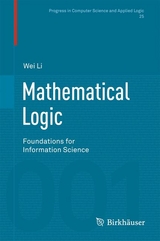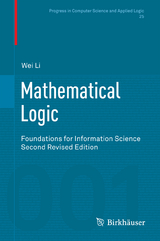Mathematical Logic
Springer Basel (Verlag)
978-3-7643-9976-4 (ISBN)
- Titel ist leider vergriffen;
keine Neuauflage - Artikel merken
Mathematical logic is a branch of mathematics that takes axiom systems and mathematical proofs as its objects of study. This book shows how it can also provide a foundation for the development of information science and technology. The first five chapters systematically present the core topics of classical mathematical logic, including the syntax and models of first-order languages, formal inference systems, computability and representability, and Gödel s theorems. The last five chapters present extensions and developments of classical mathematical logic, particularly the concepts of version sequences of formal theories and their limits, the system of revision calculus, proschemes (formal descriptions of proof methods and strategies) and their properties, and the theory of inductive inference. All of these themes contribute to a formal theory of axiomatization and its application to the process of developing information technology and scientific theories. The book also describes the paradigm of three kinds of language environments for theories and it presents the basic properties required of a meta-language environment. Finally, the book brings these themes together by describing a workflow for scientific research in the information era in which formal methods, interactive software and human invention are all used to their advantage.
This book represents a valuable reference for graduate and undergraduate students and researchers in mathematics, information science and technology, and other relevant areas of natural sciences. Its first five chapters serve as an undergraduate text in mathematical logic and the last five chapters are addressed to graduate students in relevant disciplines.
Preface.- Glossary.- 1. Syntax of First-Order Languages.- 1.1 Symbols of first-order languages.- 1.2 Terms.- 1.3 Logical formulas.- 1.4 Free variables and substitutions.- 1.5 Gödel terms of formulas.- 1.6 Proof by structural inductions.- 2. Models of First-Order Languages.- 2.1 Domains and interpretations.- 2.2 Assignments and models.- 2.3 Meanings of terms.- 2.4 Meanings of logical connective symbols.- 2.5 Meanings of formulas.- 2.6 Satisfiability and validity.- 2.7 Valid formulas on .- 2.8 Hintikka set.- 2.9 Herbrand model.- 2.10 Herbrand model with variables.- 2.11 Substitution lemma.- 3. Formal Inference Systems.- 3.1 G inference system.- 3.2 Proof trees, inference trees, and provable sequents.- 3.3 Soundness of the G inference system.- 3.4 Compactness and consistency.- 3.5 Completeness of the G inference system.- 3.6 Some commonly used inference rules.- 3.7 Proof theory and model theory.- 4. Computability and Representability.- 4.1 Formal theories.- 4.2 Elementary arithmetic theory .- 4.3 P-procedures on N.- 4.4 Church-Turhign thesis.- 4.5 Problem of representability.- 4.6 States of P-procedures.- 4.7 System of operational calculus of P-procedure statements.- 4.8 Representation of P-procedure statements.- 4.9 Representability theorem.- 5. Gödel Theorems.- 5.1 Self-referential statements.- 5.2 Deciadable sets.- 5.3 Fixed point equation in .- 5.4 Gödel incompleteness theorem.- 5.5 Gödel consistency theorem.- 5.6 Halt problem.- 6. Sequences of Formal Theories.- 6.1 Two examples.- 6.2 Sequences of formal theories.- 6.3 Proxchemes.- 6.4 Resolution sequences.- 6.5 Sequences of default expansions.- 6.6 Forcing sequences.- 6.7 Discussions about proxchemes.- 7. Refutation by Facts and Revision Calculus.- 7.1 Necessary antecedents of formal consequences.- 7.2 New conjectures and new axioms.- 7.3 Refutation by facts and maximal contraction.- 7.4 R-calculus.- 7.5 Some examples.- 7.6 Reachability of theR-calculus.- 7.7 Soundness and completeness of the R-calculus.- 7.8 Basic theorem of testing.- 8. Version Sequences and Proxchemes.- 8.1 Versions and version sequences.- 8.2 OPEN proxcheme.- 8.3 Convergency of the P-proxcheme.- 8.4 Commutativity of the P-proxcheme.- 8.5 Independency of the P-proxcheme.- 8.6 Ideal proxchemes.- 9. Inductive Inference and Inductive Process.- 9.1 Basic terms, basic sentences, and basic instances.- 9.2 Inductive inference system A.- 9.3 Inductive version and inductive process.- 9.4 GUINA proxcheme.- 9.5 Convergency of the GUINA proxcheme.- 9.6 Commutativity of the GUINA proxcheme.- 9.7 Independency of the GUINA proxcheme.- 10. Metalanguage Environments of First-Order Languages.- 10.1 Environments of three kinds of languages.- 10.2 Basic principles of the environment of metalanguage.- 10.3 Axiomatization method.- 10.4 Formalization method.- 10.5 Workflow of scientific research.- Appendix 1 Sets and Mappings.- Appendix 2 Substitution Lemma and Its Proof.- Appendix 3 Proof of the Representability Theorem.- References.- Index.
| Erscheint lt. Verlag | 11.12.2009 |
|---|---|
| Reihe/Serie | Progress in Computer Science and Applied Logic (PCS) ; 25 |
| Zusatzinfo | XII, 273 p. |
| Verlagsort | Basel |
| Sprache | englisch |
| Original-Titel | Mathematical Logic - Basic Principles and Formal Calculus, ISBN 978-7-03-020096-9 |
| Maße | 165 x 235 mm |
| Gewicht | 616 g |
| Themenwelt | Mathematik / Informatik ► Informatik ► Theorie / Studium |
| Mathematik / Informatik ► Mathematik ► Allgemeines / Lexika | |
| Mathematik / Informatik ► Mathematik ► Logik / Mengenlehre | |
| Schlagworte | arithmetic • Calculus • first-order language • forcing • formal calculus • Gödel theorem • inference system • language environment • Lemma • Logic • Mathematical Logic • model Theory • Proof • Proof theory • revision calculus • version sequence |
| ISBN-10 | 3-7643-9976-7 / 3764399767 |
| ISBN-13 | 978-3-7643-9976-4 / 9783764399764 |
| Zustand | Neuware |
| Informationen gemäß Produktsicherheitsverordnung (GPSR) | |
| Haben Sie eine Frage zum Produkt? |
aus dem Bereich





